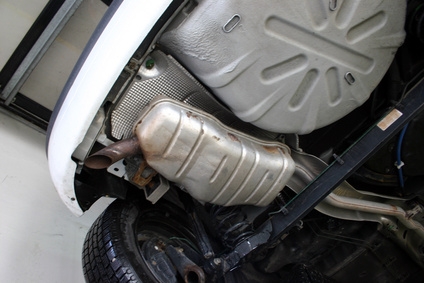
A loud exhaust can be present on a car, a truck or a motorcycle. A muffler sits at the tail end of the car's exhaust system, drawing engine fumes and noise away from the passenger area or compartment. Most exhaust systems are designed to quiet the noise, while there are some catalytic converters, resonators and mufflers that allow for louder noise levels for drivers seeking a rougher image for their vehicles---or for themselves.
One of the biggest disadvantages of a loud exhaust, if it has gradually or suddenly become loud on its own, is that there is damage to one or more locations in the exhaust system. AA1Car notes that damage can occur as a result of exposure to winter salt or by being subjected to frequent short-trip, stop-and-go driving Although some drivers might enjoy a little rougher-sounding exhaust, a real danger may actually exist. Damage along the exhaust system may mean that deadly fumes are entering the passenger compartment. Western Tire And Auto adds that exhaust system damage also impairs a vehicle's performance by failing to remove harmful elements that build up inside the engine. A loud exhaust can also hide the sirens of emergency vehicles from the driver, causing her to fail to yield to warnings or the right of way.
The National Institute on Deafness and Other Communication Disorders (NIDCD) reports that exposure to loud sounds that last a long time, such as driving a car with a loud exhaust, can damage the small sensory cells in the ear. Unfortunately these cells, once damaged, do not grow back or repair themselves. The NIDCD further notes that long or repeated exposure to sounds at or above 85 decibels can cause hearing loss. The typical decibel level of a motorcycle is between 120 and 150 decibels.
Some individuals mistakenly believe that a louder vehicle equals a more powerful one, according to Citizens Against Noise (CAN). The fact is, that sound has little to do with measurable power. More often, people perceive a loud exhaust as delivering a negative message about the vehicle's driver. These perceptions include anti-social, rude, selfish, aggressive and untrustworthy behavior.
The American Motorcyclist Association believes that few other factors contribute more to misunderstanding and prejudice against the motorcycling community than excessively noisy motorcycles. The social effects of a loud exhaust exceed prejudicial perceptions. In a report published in the March 2007 issue of the "Southern Medical Journal," Lisa Goines, R.N., and Dr. Louis Hagler, M.D., reported that noise pollution produces direct and cumulative adverse effects that impair health and that it degrades residential, social, working, and learning environments. Loud exhaust can be attributed to economic losses and reduced well-being for the driver and others exposed to the repeated levels of noise.